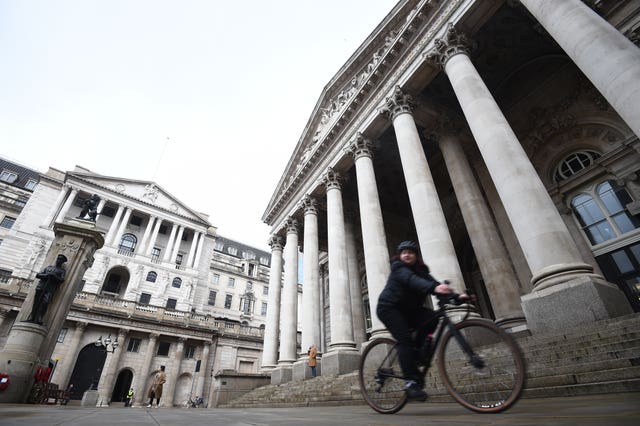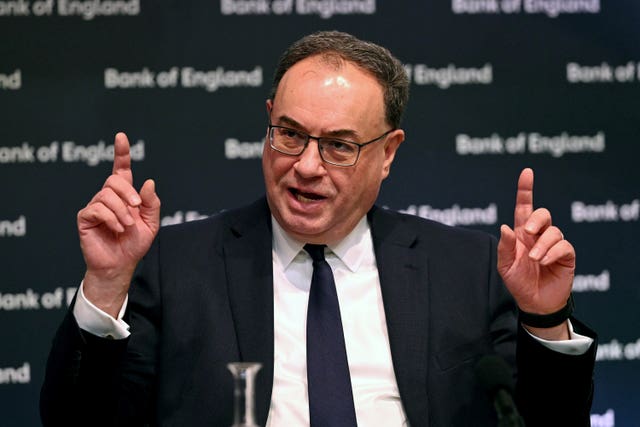
Britain’s interest rates are expected to rise to the highest level since 2008.
According to economists and the financial markets, the base rate will rise for the 12th consecutive time as inflation continues to soar.
Policymakers at the Bank of England are expected to raise interests from 4.25% to 4.5% on Thursday, representing a 0.25 percentage point increase.
The move will make it even more expensive to borrow, pushing banks to lift savings rates.
It comes as UK Consumer Prices Index (CPI) inflation remained firmly in double digits in March, squeezing household budgets and proving more stubborn than expected.
The Bank’s aim in elevating interest rates is to bring UK inflation down to its 2% target.
But experts will be watching the Bank’s Monetary Policy Report closely on Thursday for its economic forecasts, and an indication on what the future holds for inflation and rates.
READ MORE: High interest rates continue to cause volatility
In February, when the last report was produced, the Bank said it expects inflation to fall sharply over the rest of the year.
But with CPI remaining above double-digits since then, the latest report will be watched closely for signs this forecast has changed.
Furthermore, experts said the Bank’s policymakers could give more of an indication over what the future holds for rates.
Ellie Henderson, from Investec Economics, said the “clock is ticking” on the Bank’s monetary policy tightening cycle, and an increase on Thursday could be the last.
 The Bank of England is expected to raise interest rates this week for the 12th consecutive time (Kirsty O’Connor/PA)
The Bank of England is expected to raise interest rates this week for the 12th consecutive time (Kirsty O’Connor/PA)
She said: “As things stand and considering the sharp downward influences on inflation in the coming months, namely from energy but also from cooling food and goods price inflation, we suspect that this could be the last hike by the Bank of England in this cycle.”
However, there is still a “high chance” the Bank will decide to lift rates by 0.25 percentage points again in June, especially if inflation remains stubbornly above target, she added.
“What is clear is that the days of successive interest rate hikes in this economic cycle are limited, but the exact endpoint is clouded with uncertainties.”
 In the last Monetary Policy Report, in February, the Bank’s Governor Andrew Bailey said UK inflation is expected to come down sharply this year (Leon Neal/ PA)
In the last Monetary Policy Report, in February, the Bank’s Governor Andrew Bailey said UK inflation is expected to come down sharply this year (Leon Neal/ PA)
Klaus Baader, the global chief economist at French bank Societe Generale, agreed that while a 0.25 percentage point is expected from the Bank, “what is less certain is what it will do afterwards”.
READ MORE: Bank of Scotland owner Lloyds in 46 per cent profit surge
He said it is likely policymakers will no longer predict a recession, having previously anticipated the UK would dip into a short and shallow recession during the first quarter of the year.
The outcome will help economists determine whether interest rates will rise above 4.5% this year.
 The move will make it even more expensive to borrow, pushing banks to lift savings rates (Steve Parsons/PA)
The move will make it even more expensive to borrow, pushing banks to lift savings rates (Steve Parsons/PA)
New quarterly gross domestic product (GDP) figures will be released on Friday, which is expected to show the UK economy grew over the first three months of the year.
Meanwhile, the US’s Federal Reserve decided last week to raise interest rates by 0.25 percentage points, but hinted it could be the last hike before rates start to come back down.
Whereas the European Central Bank (ECB) also opted for a 0.25 percentage point increase but left the door open for further increases, with president Christine Lagarde saying “the inflation outlook continues to be too high for too long”.



Why are you making commenting on The Herald only available to subscribers?
It should have been a safe space for informed debate, somewhere for readers to discuss issues around the biggest stories of the day, but all too often the below the line comments on most websites have become bogged down by off-topic discussions and abuse.
heraldscotland.com is tackling this problem by allowing only subscribers to comment.
We are doing this to improve the experience for our loyal readers and we believe it will reduce the ability of trolls and troublemakers, who occasionally find their way onto our site, to abuse our journalists and readers. We also hope it will help the comments section fulfil its promise as a part of Scotland's conversation with itself.
We are lucky at The Herald. We are read by an informed, educated readership who can add their knowledge and insights to our stories.
That is invaluable.
We are making the subscriber-only change to support our valued readers, who tell us they don't want the site cluttered up with irrelevant comments, untruths and abuse.
In the past, the journalist’s job was to collect and distribute information to the audience. Technology means that readers can shape a discussion. We look forward to hearing from you on heraldscotland.com
Comments & Moderation
Readers’ comments: You are personally liable for the content of any comments you upload to this website, so please act responsibly. We do not pre-moderate or monitor readers’ comments appearing on our websites, but we do post-moderate in response to complaints we receive or otherwise when a potential problem comes to our attention. You can make a complaint by using the ‘report this post’ link . We may then apply our discretion under the user terms to amend or delete comments.
Post moderation is undertaken full-time 9am-6pm on weekdays, and on a part-time basis outwith those hours.
Read the rules hereLast Updated:
Report this comment Cancel